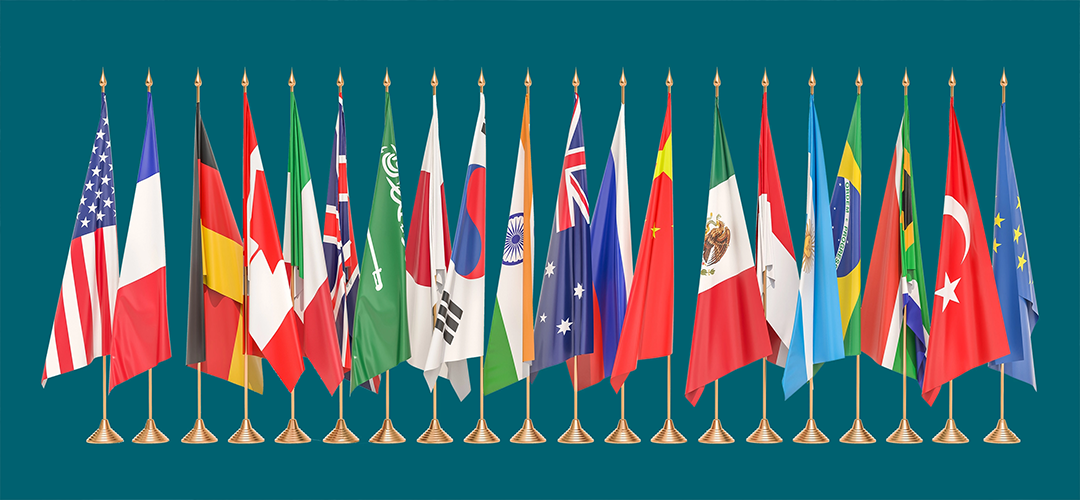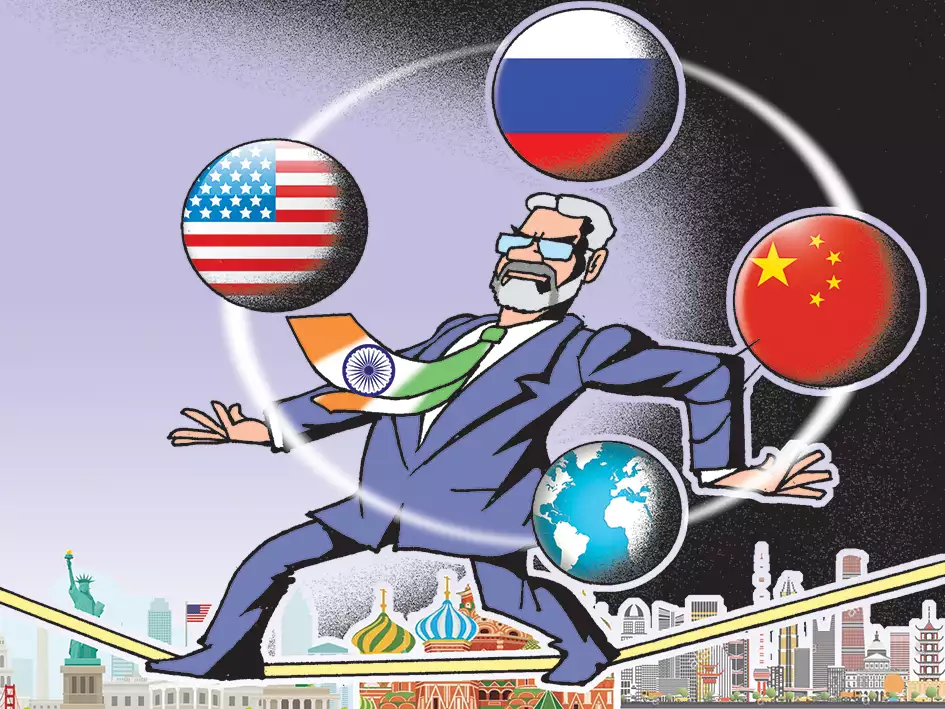MULTIALIGNMENT OR...?
December 17, 2022 | Expert Insights

India is at an inflexion point as it grows in power and influence, and its area of influence expands. In an increasingly multipolar world where the U.S., China, EU and other regional blocks compete over control of the global value chain, India must decide upon the trajectory of its foreign policy to deal with the changing contours of geopolitics.
Background
When the newly independent Indian nation was born in 1947, the world had just come out of a tumultuous period of conflict. While there was a scramble to join one side or the other in the cold war, India took a principled stand by adopting the Panchsheel principles. However, Panchsheel did not prevent Communist China from violating India's sovereignty nor inhibit India from creating Bangla Desh when the need arose through ofmilitary power.
The 1990s saw Indian foreign policy changing again due to domestic factors (the liberalization, privatization and globalization (LPG ) reforms) as well as external factors (the dissolution of the USSR and the dominance of the Washington Consensus). The 1990s ended with India asserting its power through nuclear tests, shaping the next decade's foreign policy discourse. India’s explosive economic growth increased its soft power when dealing with world powers, with the U.S. and India entering a Civil Nuclear Arrangement in 2008. The next decade saw India focusing more on aligning with multiple power blocks as per our needs and working on increasing its power in the region through the ‘Look East, Act East’ and ‘Neighbourhood First’ policies.
With the world threatened again by a looming faceoff between the U.S. and China, with Russia on the sidelines, India needs to weigh its foreign policy options with greater prudence. India’s foreign policy for the future will reflect its position as a global power next to other hegemons such as the U.S. and China.

Analysis
The U.S. has its eyes set on containing the growth of China and preserving its status as the only superpower. India can play its cards right and extract maximum benefits from this situation by channelling trade and investments from the U.S. and its partners to the region. Partnership with the U.S. can help us further our strategic interests in the world fora, especially when dealing with Pakistan and the question of terrorism, an area where China has been undermining us.
China’s debt trap diplomacy of creating ‘white elephant’ projects has given India a chance to secure support and cooperation from our regional partners, such as Japan and Thailand who will be cautious of falling into the Chinese trap. India can leverage this to increase its manufacturing, research, and development capacities by inviting these partners to set up their facilities here. Combine this with the desire of the U.S. and EU to decouple from the China-dominated global value chain, and we see a ripe opportunity to advance India's goals in the long term.
When assessing the links with our all-weather ally Russia, India must continue its policy of strategic autonomy where we do not shut down all the links because of pressure from the West. India’s move of not completely denouncing the Russia-Ukraine war while not supporting it is also a good model to follow in the long term for India to continue benefiting from this partnership.
Russia serves as a reliable source of cheap fuel and ammunition and diplomatic support in the United Nations Security Council (UNSC). Until India can gain a permanent seat in the security council, we will have to use all avenues of support we can get to further our strategic interests. Till the conflict in Ukraine reaches its culminating point, one way or the other, India must continue its act of pragmatic decision-making as long as we can exploit this situation for our needs.
China is hell-bent on creating a multipolar world but a unipolar Asia. The relationship with China is where India can make no mistakes. India’s foreign policy has to accommodate the economic and soft power competition with China and the Chinese claim over parts of India's territory. China has a well-established position in the global supply chain, opening more avenues for China in the global arena. India’s foreign policy must focus on not escalating any conflicts in the border regions while simultaneously building up our defence capacities to deter any further attempts from China to challenge India’s territorial integrity. Along with this, India must counter the Chinese foreign policy by offering to support our friendly neighbours without pushing them into any debt trap.
Africa has the maximum potential for the future, and India cannot afford to take its eyes off its diplomatic goals in the continent. China is already betting on this growth as it continues to pour in resources to African countries, the latest being the new headquarters of the Economic Community of West African States (ECOWAS) in Abuja, Nigeria. India's long-term plan here can be to use the growing young population to expand the usage of our ‘India Stack’ in the digital services space.
There are risks in pursuing a long-term foreign policy that aligns India relatively closer to the U.S. and its partners than China, especially if China eclipses the U.S. in the future. With the U.S. unable to control even its Arab partners from engaging with China, it remains doubtful if they can revive their past glory. A careful assessment of the geopolitical events in the next decade would tell us if the policy direction discussed above is worth continuing. Regardless of the future changes in the global order, pragmatic policymaking will help India reap the benefits of cooperation while not being bound by any ideological camps.
Assessment
- In the current global scenario, a policy of strategic autonomy with a preference for the U.S.-led Indo-Pacific combine could deliver returns for India in various areas in the long term. It would open up markets and bring trade and investment while generating support in international fora.
- China remains an unreliable but unavoidable neighbour in the short term. Indian foreign policy must focus on decoupling from the Chinese supply chain while safeguarding India's territorial integrity.
- Russia is an ageing warhorse that is dependable but not sufficiently powerful for pursuing our strategic interests in the long term. Reviewing our relationship with Russia may be pragmatic with the ebb and flow of regional and global geopolitics, as only national interests are permanent.








Comments